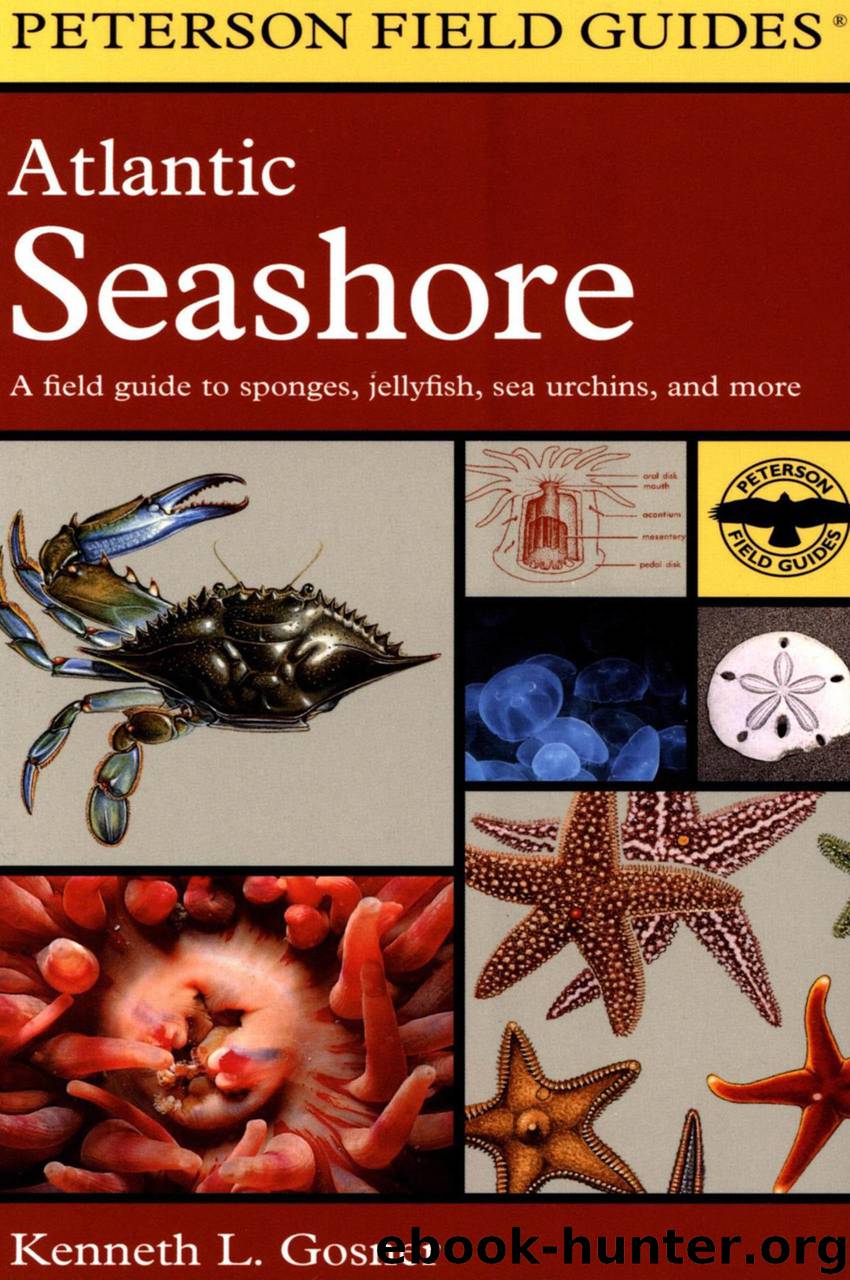A Field Guide to the Atlantic Seashore by Roger Tory Peterson Kenneth L. Gosner

Author:Roger Tory Peterson, Kenneth L. Gosner
Language: eng
Format: epub
Published: 2019-04-21T16:00:00+00:00
Care of Live Material: Many marine animals can be kept alive in aquariums, and a tank with a few, varied, mutually tolerant inhabitants is a constant source of discovery. The first problem is to get the material home in good condition. Temperature and oxygen supply are the key factors. Don’t crowd your specimens. You will fare better by taking just a few carefully selected animals than by collecting indiscriminately with the intention of sorting out aquarium candidates many hours later. Crowding aggravates the shock of moving an animal from the wide ocean to a small container.
In the field keep your collection cool and well-protected from the sun. Specimens in plastic sandwich bags can be placed in a baitfish trap and anchored in a safe shady place or immersed in a quiet pool until you are ready to leave the shore. Then transport them in an ice chest with enough ice to keep the temperature low but not frigid. Give the collection a change of water before starting home; on extended trips along the coast replace the water once or twice a day en route. Take an aerator, hose, and air stones (all available at pet shops) with you and use them whenever possible, such as when you are camping or staying in a motel overnight. Battery-powered equipment is available. Watch out for casualties and remove them promptly—and of course separate potential predators and prey.
It is helpful to have a saltwater aquarium ready and waiting when you reach home. Aquariums should be all glass or plastic and have adequate filtration and aeration. Avoid sudden and extreme changes of temperature when transferring specimens; leave material in plastic bags and immerse both in the established tank for a half-hour or so to allow temperatures to equalize.
Some animals adjust better than others to aquarium life. These will settle down to a long residence; others may live for only a few days or weeks, and some will not survive the trip home. New animals may appear spontaneously even in long-established tanks as subtle changes in water chemistry bring resting stages to life or allow the development of undetected larvae. Your aquarium will never be balanced in the sense of being a stable, self-sustaining system. It is too small a cosmos to support a real plankton community, which is the base of most marine food pyramids. Indirect light is preferable to avoid excess proliferation of algal scums. Seaweed cultivation is a special project in itself and probably not practical on a long-term basis in small aquariums.
Vigorous predators such as large crabs require solitary confinement, but less ferocious ones add interest to the activity of a tank. Small crabs, hermit crabs, anemones, sea stars, and such will eat bits of baitfish cut from a frozen supply. Fishes, such as killies (mummichogs), pipefish, small flatfish, and other tolerant estuarine forms easily caught with bait seines or traps, make interesting aquarium companions for invertebrates. A balanced dried fish food will supply them with sustenance, and the fragments missed by larger fishes may be sufficient for detritus- and filter-feeding invertebrates.
Download
This site does not store any files on its server. We only index and link to content provided by other sites. Please contact the content providers to delete copyright contents if any and email us, we'll remove relevant links or contents immediately.
The Lonely City by Olivia Laing(4799)
Animal Frequency by Melissa Alvarez(4467)
All Creatures Great and Small by James Herriot(4314)
Walking by Henry David Thoreau(3955)
Exit West by Mohsin Hamid(3824)
Origin Story: A Big History of Everything by David Christian(3690)
COSMOS by Carl Sagan(3619)
How to Read Water: Clues and Patterns from Puddles to the Sea (Natural Navigation) by Tristan Gooley(3466)
Hedgerow by John Wright(3356)
How to Read Nature by Tristan Gooley(3336)
The Inner Life of Animals by Peter Wohlleben(3313)
How to Do Nothing by Jenny Odell(3295)
Project Animal Farm: An Accidental Journey into the Secret World of Farming and the Truth About Our Food by Sonia Faruqi(3219)
Origin Story by David Christian(3196)
Water by Ian Miller(3181)
A Forest Journey by John Perlin(3069)
The Plant Messiah by Carlos Magdalena(2927)
A Wilder Time by William E. Glassley(2859)
Forests: A Very Short Introduction by Jaboury Ghazoul(2836)
